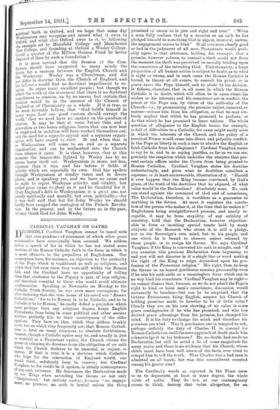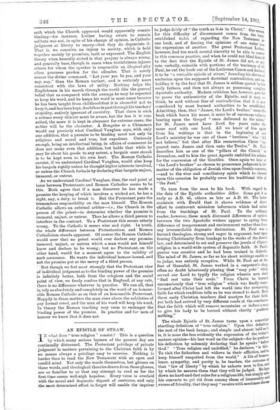CARDINAL VAUGHAN ON OATHS.
DECIDEDLY Cardinal Vaughan cannot be taxed with that over-prudence of statement of which other great ecclesiastics have occasionally been accused. We seldom notice a speech of his in which he has not stated some doctrine of the Roman Catholic faith in the form in which it is most offensive to the prejudices of Englishmen. Our countrymen have, for instance, an objection to the authority of the Pope which is traditional as well as religious, and which they felt even when they were still within the Roman fold, and the Cardinal loses no opportunity of telling them that obedience to the Papacy is part of true religion, and therefore essential to those who would avoid ultimate condemnation. Speaking at Newcastle on Monday. to the Catholic Truth Society, he was even more courageous, for after declaring that the true name of his creed was "Roman Catholicism," "for to be Roman is to be Catholic, and to be Catholic is to be Roman," he coolly defied a prejudice which more perhaps than any religious dogma keeps English Protestants from being in some political and other secular matters perfectly fair to their countrymen of the older opinions. They have an idea, which they seldom frankly avow, but on which they frequently act, that Roman Catholi- cism is fatal on many occasions to absolute faithfulness, because, though a Catholic squire may be, and usually is, just as truthful as a Protestant squire, the Church claims the Power of releasing its devotees from the obligation of an oath which the Church declares to be immoral, or unjust, or untrue. If that is true, it is a doctrine which Catholics who hope for the conversion of England would, one would think, sedulously keep in reserve ; but Cardinal Vaughan, to his credit be it spoken, is utterly contemptuous of any such reticence. He denounces the Declaration made by our Kings when ascending the throne as not -only blasphemous," but entirely uselesz, incause no engage- ment, no promise, no oath is lawful unless the thing promised or sworn to is just and right and true." "When, a man fully realises that by a Drorrise or an oath he has pledged himself to something that is unjust, immoral, untrue, the engagement ceases to bind." If all acts were clearly good or bad in the judgment of all men, Protestants would prob- ably agree to that utterance, holding, for example, that a promise, however solemn, to commit a theft could not from the moment the theft was perceived be morally binding upon the conscience of the intending thief. Unfortunately, a large proportion of all human action is subject to doubt as to what is right or wrong, and in such cases the Roman Catholic is bound, in theory at all events, to consult his priest, or in grave cases the Pope himself, and to abide by his decision. It follows, therefore, that in all cases in which the Roman Catholic is in doubt, which will often be in cases where his wishes or his interests and his conscience are in conflict, the priest or the Pope can, by virtue of the authority of the Church—i.e., by pronouncing the promise unjust, immoral, or untrue—release him from his obligation, so that he may sin- lessly neglect that which he has promised to perform, or do that which he has promised to leave undone. The whole question of allegiance to the English house, for example, is full of difficulties to a Catholic, for cases might easily arise in which the interests of the Church and the policy of a heretical Prince would come into direct and palpable conflict. Is the Pope at liberty in such a case to absolve the English or Irish Catholic from his allegiance ? Cardinal Vaughan seems to say he is, and in so saying justifies, so far as we can see, precisely the suspicion which underlies the statutes that pre- vent certain offices under the Crown from being granted to Roman Catholics. Cardinal Vaughan states his doctrine unhesitatingly, and gives what he doubtless considers a supreme, or at least unanswerable, illustration of it. "Should it ever happen that the King became convinced, by God's grace, of the truth of the doctrines that he abjured, of what value would be the Declaration ? Absolutely none. No oath can stand against the command of. God and of conscience, The Declaration, therefore, is worthless as a guarantee to anything in the future. At most it registers the convic- tion of the person who makes it, at the time that he makes it." Englishmen being straightforward persons, and nearly in- capable, it may be from stupidity, of any subtlety of casuistry, hold that the Declaration, however objection- able in form as insulting special tenets held by many subjects of the Monarch who utters it, is still a pledge, not to the Sovereign's own mind, but to his people, and one which he is bound to observe, unless released by those people, or to resign his throne. No, says Cardinal Vaughan, if the King is converted his oath is naught, and "if you examine this precious Declaration from beginning to end you will not discover in it a single line or word making the right of the King to reign dependent upon his pro- fession of the Protestant religion." His right, then, to keep the throne as an honest gentleman remains presumably even if he sets his oath aside as a meaningless form which can in no way bind his conscience. Cardinal Vaughan may be right— we cannot diseuss that, because, as we do not admit the Pope's right to bind or loose nien's consciences, discussion would necessarily be baseless—but can he be surprised that the bitterer Protestants, being English, suspect his Church of holding promises made to heretics to be of little value ? Clearly they are, on his own showing, of no value in some grave contingencies if he who has promised, and who has derived grave advantage from his promise, has changed his mind. It is his duty to change his mind, and therefore his promises are wind. Was it, perchance, one is tempted to ask, perhaps unfairly, the duty of Charles II. to conceal his Roman Catholicism until the near approach of death made him acknowledge it in his bedroom ? He, no doubt, had made no Declaration, but still he acted a lie of some magnitude for many years, and there is no evidence that his Church, whose chiefs must have been well aware of the facts, ever tried to compel him to tell the"truth. That Charles was a bad man is admitted on all hands, but was this concealment counted among his graver sins ?
The Cardinal's words as reported in the Times Deem to us to depreciate, at least in some degree, the whole value of oaths. They do not, as our contemporary seems to think, destroy that value altogether, for an • oath which the Church approved would apparently remain binding—for instance, Luther having sworn to remain celibate was not, in spite of his change of opinion, in Catholic judgment at liberty to marry—but they do depreciate it. That is, we conceive, an injury to society, which is held together mainly by promises, tacit or expressed. The English theory when honestly stated is that perjury is always wrong, and generally base, though in cases when truthfulness injures others for whom the speaker is responsible an illogical pity often procures pardon for the offender. That is surely nearer the divine command, "Let your yea be yea, and your nay, nay," than the Roman variant, and is certainly more consistent with the laws of utility. Nothing helps the Englishman in his march through the world like the general belief that as compared with the average he may be expected to keep his word, and he keeps his word in most cases because he has been taught from childhood that it is shameful not to keep it, and has been kept, doubtless in part through his teachers' stupidity, entirely ignorant of casuistry. That there is such a science every thinker must be aware, but the less it is con- suited, the more it is kept in abeyance for extreme cases, the nobler will be the character. A Beng,alee or a Chinaman would say precisely what Cardinal Vaughan says, with only one addition, that a promise- to be binding must not only be religious and moral and true, but expedient. Curiously enough, being an intellectual being, in affairs of commerce he does not make even that addition, but holds that while he may lie about his goods to any extent, a bargain once struck is to be kept even to his own hurt. The Roman Catholic casuist, if we understand Cardinal Vaughan, would also keep his bargain rigidly unless he thought higher interests involved, or unless the Church forbade by declaring that bargain unjust, immoral, or untrue.
As we understand Cardinal Vaughan, then, the real point at issue between Protestants and Roman Catholics seems to he this. Both agree that if a man discovers he has made a promise the keeping of which involves a wicked act, he has a right, nay, a duty, to break it. But the Protestant puts the tremendous responsibility on the man himself. The Roman Catholic allows an external arbiter—i.e., the Church in the person of the priest—to determine whether the promise is immoral, unjust, or untrue. Thus he allows a third person to interfere in the contract. To a Protestant this seems utterly wrong. TO the Catholic it seems wise and right. In truth, the whole difference between Protestantism and Roman Catholicism stands apparent. Of course the Roman Catholic would aver that no priest would ever declare any promise immoral, unjust, or untrue which a man would not himself know and declare to be wrong; but no Protestant, on the other hand, would for a moment agree to the validity of such assurance. He wants the individual honour-bound, and not the promise put at the mercy of a third person.
But though we feel most strongly that the Protestant view of individual judgment as to the binding power of the promise is infinitely better, both from the religious and the social point of view, we freely confess that in England, at any rate, there is no difference whatever in practice. We can all, that is, rely as absolutely and completely on the word of an honour- able Roman Catholic as on that of an honourable Protestant. Happily in these matters the man rises above the subtleties of any formal creed, and the man of his word will keep his word, In theory the Roman teaching may seem to endanger the binding power of the promise. In practice and for men of honour we know that it does not.







































 Previous page
Previous page